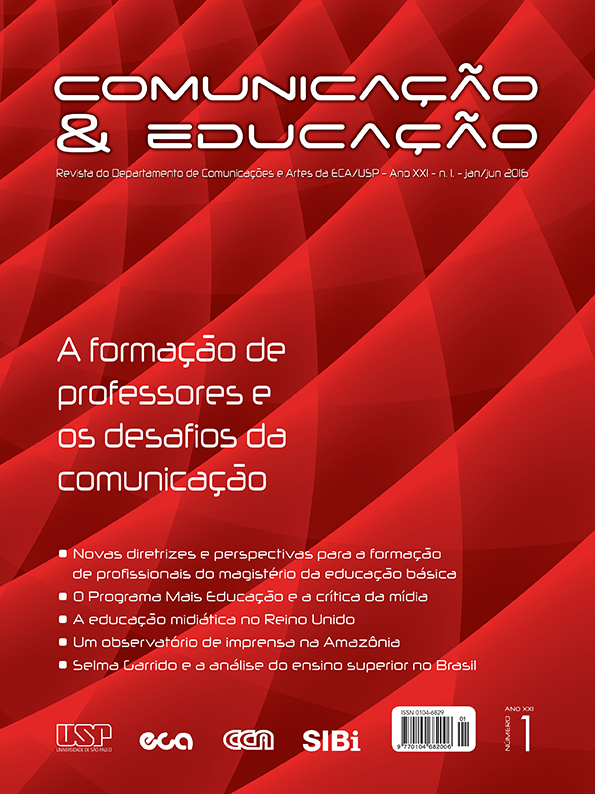The evolution of media education in the UK: some lessons from history
DOI:
https://doi.org/10.11606/issn.2316-9125.v21i1p73-83Keywords:
Educação midiática no Reino Unido, pensamento educacional, currículo escolar, ensino.Abstract
Media education in the UK has a long history, and has been an established element of the school curriculum for around 25 years. However, in the past decade it has faced increasing challenges. In this article, we want to explain these developments, not least in the hope that educators might avoid some of the obstacles we have encountered. In doing so, we hope to present the history of media education not just as a succession of ideas, but also to explain why particular educational approaches have arisen in particular historical circumstances.
Downloads
References
ALVARADO, M. and BOYD-BARRETT, O. (eds.) Media Education: An Introduction London: British Film Institute and The Open University Press, 1992.
_______________ COLLINS, R. and DONALD, J. The Screen Education Reader London: Routledge, 1993
_______________GUTCH, R. and WOLLEN, T. Learning the Media London: MacMillan, 1987.
ARNOLD, M. Culture and Anarchy Oxford: Oxford University Press, 1867/2009.
BALL, S. The Education Debate Bristol: Policy Press, 2013.
BAZALGETTE, C. (ed.) Primary Media Education: A Curriculum Statement London: British Film Institute, 1989.
BOWKER, J. (ed.) Secondary Media Education: A Curriculum Statement London: British Film Institute, 1991
BUCKINGHAM, D. After the Death of Childhood: Growing Up in the Age of Electronic Media Cambridge: Polity, 2000
_________________ Media Education: Literacy, Learning and Contemporary Culture Cambridge: Polity, 2003
__________________ Beyond Technology: Children’s Learning in the Age of Digital Culture Cambridge: Polity, 2007
__________________ ‘The future of media literacy in the digital age: some challenges for policy and practice’, in Verniers, P. (ed.) Media Literacy in Europe: Controversies, Challenges and Perspectives Brussels: Euromeduc, 2009.
__________________ ‘Do we really need media education 2.0? Teaching media in the age of participatory culture’, pp. 287-304 in K. Drotner and K. Schroder (eds.) Digital Content Creation New York: Peter Lang, 2010.
___________________ ‘The success and failure of media education’, Media Education Research Journal 4(2): 5-18, 2013.
HALL, S. and Whannel, P. The Popular Arts London: Hutchinson, 1964.
HOGGART, R. The Uses of Literacy London: Chatto and Windus, 1959.
LEAVIS, F. and THOMPSON, D.Culture and Environment London: Chatto and Windus, 1933.
LUSTED, D.'A history of suspicion', in Lusted, D. and Drummond, P. (eds.) TV and Schooling London: British Film Institute, 1985.
MASTERMAN, L. Teaching About Television London: Macmillan, 1980.
_______________ Teaching the Media London: Comedia, 1985.
WALLIS, R. and Buckingham, D.‘Arming the citizen-consumer: the invention of “media literacy” within UK communications policy’, European Journal of Communication 28:5, 527-540, 2013.
WILLIAMS, R. Culture and Society London: Chatto and Windus, 1958.
Downloads
Published
Issue
Section
License
I authorize the publication of the submitted article and soon the copyrights to the magazine, in the printed and electronic version, if it is approved after the evaluation of the reviewers.
I understand that readers may use this article without prior request, provided the source and authorship are mentioned. Readers are not authorized to use this article for reproduction, in whole or in part, for commercial purposes.

































